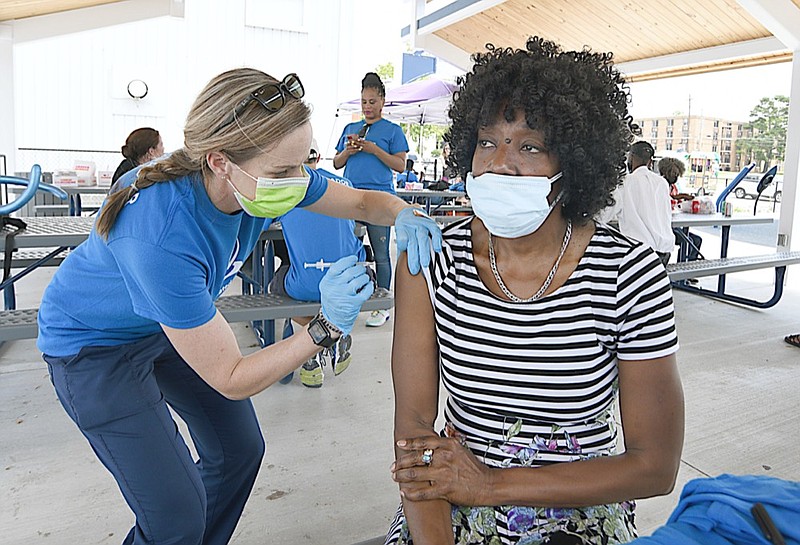Hamilton County's COVID-19 numbers continue to improve to levels not seen since the early days of the pandemic, but a more contagious strain of the coronavirus - known as the Delta variant - could reverse the positive trends.
As of Friday, the Hamilton County Health Department reported a seven-day moving average of nine new COVID-19 cases per day, although testing levels are also the lowest they've been since last spring, when widespread testing first became available. There were 12 patients hospitalized in the county, nine of them from other counties.
Dr. Chris Young, chief of staff at Erlanger Health System, told the Erlanger board of trustees during a public meeting that the hospital had just one COVID-19 patient on Thursday.
"We're thankful for that, but I think it's important to say that the pandemic is not over," Young said. "We have a virulent Delta variant that is in our community, and with a very low vaccination rate, I think it would be prudent to consider that we may have a resurgence in COVID come the fall and simply encourage anyone that can hear me now to encourage everyone that can to get vaccinated."
The U.S. Centers for Disease Control and Prevention website states that coronavirus variants of concern circulating in the United States are B.1.1.7 - known as the variant first detected in the U.K. and now referred to as the alpha variant - B.1.351 (beta), P.1 (gamma), B.1.427 (epsilon), B.1.429 (epsilon) and B.1.617.2, which is the delta variant first detected in India.
The CDC website states that B.1.1.7 remains the dominant strain in the Southeast U.S. at this time, accounting for an estimated 63.3% of all positive COVID-19 cases as of June 22. The delta variant accounts for about 3.9% of the region's cases.
The delta variant is most prevalent in the interior regions of the U.S. - stretching from Montana to Colorado east toward Missouri and Iowa - where it represents an estimated third of all cases. Many of those states are also seeing the highest rates of COVID-19 case increases in the country.
"This delta variant is even more transmissible than the U.K. variant, so not only is it more transmissible but there is some concern that it actually may lead to more severe illness, so we're watching that very carefully," CDC Director Rochelle Walensky told NBC News on Wednesday, adding that it appears at this time that fully vaccinated people still have strong protection against the delta variant.
Photo Gallery
Sunrise Service
The Community Easter Sunrise Service in Little Rock's Riverfront Park Sunday.
"What worries me most is we have pockets of this country that are less vaccinated than others," she said.
Tennessee, Georgia and Alabama are among the least vaccinated states in the country.
Few COVID-19 samples are tested for variants because it requires genetic sequencing, which is a more sophisticated and expensive laboratory technique.
Elizabeth Forrester, co-founder and technical director at Athena Esoterix - which conducts COVID-19 testing for several providers in the Chattanooga region - said that throughout late May and early June, nearly all of the COVID-19 positive samples that came through the lab were the alpha variant. However, lately, the lab has noticed a shift.
"When we did some sequencing, a few weeks ago, we had actually South African, and we started catching some of the delta," Forrester said.
Throughout the pandemic, the Chattanooga region has often lagged a bit behind other states when it comes to case increases, she said.
"I think it is smart to pay attention to other areas where the vaccination rates are kind of similar - around 30% or so - and some of those states are starting to see an increase in cases," Forrester said. "We're kind of expecting that to happen because it's just what the virus is going to do. We know that it's here, we know people that are unvaccinated or unmasked ... Everyone just needs to pay attention and do their best to get vaccinated and use those mitigation strategies."
Contact Elizabeth Fite at efite@timesfreepress.com or follow her on Twitter @ecfite.

